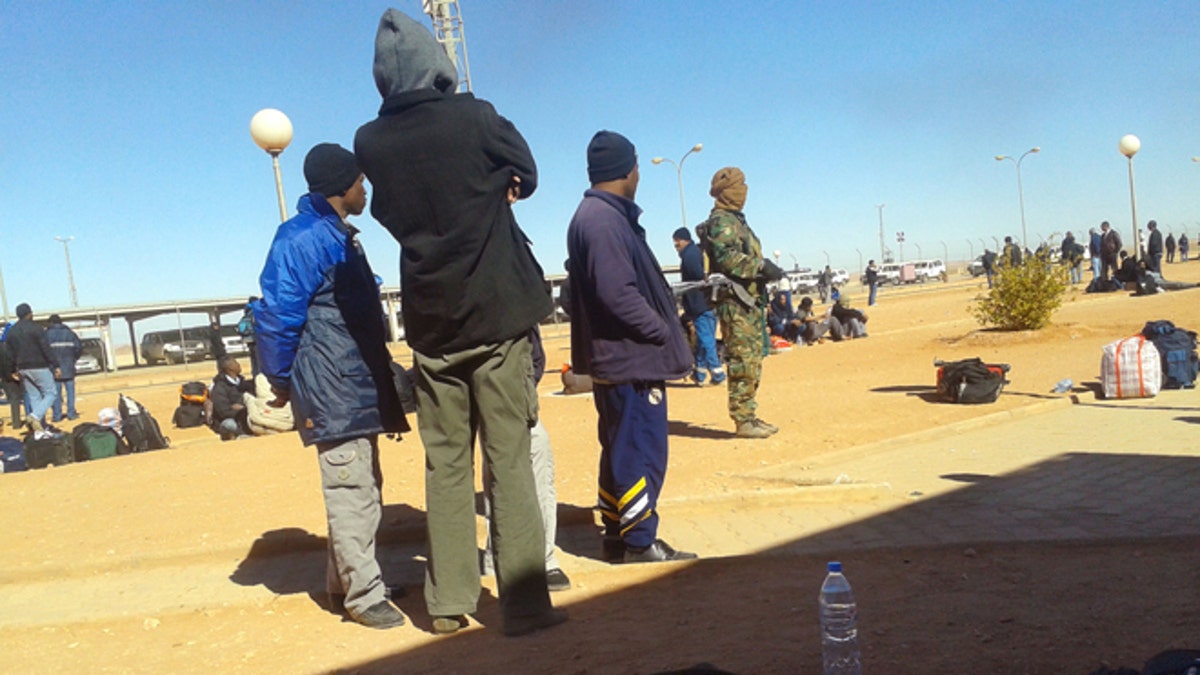
In this Jan. 16, 2013 photo secretly taken by a hostage, an Islamic militant, in camouflage uniform, rear right, stands near Algerian employees who were forced to leave their houses with their belongings at the Ain Amenas natural gas complex in Ain Amenas, Algeria. (AP)
With the U.S. military now planning a new drone base to track extremists in northern Mali, senior U.S. intelligence officials confirmed Thursday that the Al Qaeda affiliate in North Africa aspires to strike more U.S. and other western targets in the region.
This includes "hardened" targets such as diplomatic and military facilities, as well as "soft" targets, such as American citizens working in North Africa. The warning follows the deadly terrorist strike on an Algeria gas plant in which dozens of hostages, including three Americans, were killed.
Senior U.S. intelligence officials said that in the aftermath of the Algeria crisis, the intelligence suggests Al Qaeda in the Islamic Maghreb wants "to carry out more attacks against western interests."
Officials were careful to emphasize there was no evidence of active, credible plots.
Senior U.S. intelligence officials also said they are "taking very seriously reports of two Canadians" participating in the Algeria hostage crisis because, if confirmed, it would show extremists in the region were successfully attracting foreigners in the same way Afghanistan did before 9/11, and Iraq did after the fall of Saddam Hussein.
In recent congressional hearings on the Sept. 11, 2012, Benghazi terrorist attack, Secretary of State Hillary Clinton seemed to underscore the intelligence community's assessment.
"Yes, we now face a spreading jihadist threat. We have driven a lot of the (Al Qaeda) operatives out of ... Afghanistan, Pakistan. Killed a lot of them, including of course, bin Laden. But we have to recognize this is a global movement," Clinton explained.
Available intelligence leaves no doubt, according to senior U.S. intelligence officials, that Mokhtar Belmokhtar -- who seemed to split from Al Qaeda in North Africa in December when he set up his own group -- is the regional operative "most closely associated with the Al Qaeda global brand."
Belmokhtar was characterized as "deeply involved in the planning" of the hostage crisis at the Amenas gas facility that left 38 workers dead earlier this month.
While the attack is still being investigated, the Algerian operation suggested "weeks" of planning was involved, including reconnaissance and familiarity with the security footprint in the plant.
At the same time Al Qaeda in North Africa seems to be gaining momentum, senior U.S. intelligence officials said that striking strong counterterrorism partnerships in the region is challenging -- as the U.S. is facing an arc of instability stretching from Somalia in the east to Mali in West Africa. The Arab Spring has toppled long-time allies, and sidelined or degraded the performance of regional intelligence agencies. In addition, Libya's loose weapons are said to be "fueling AQIM's capability."
Unlike the tribal areas of Pakistan where the U.S. could partner with one nation, no matter how imperfect the relationship, Al Qaeda in the Islamic Maghreb is a regional player as its followers move seamlessly across Mali, Niger, Mauritania and Algeria. Each nation may be more concerned with the AQIM problem within its own borders, and less concerned with taking a broader, regional leadership role -- which would be critical to block the establishment of a regional safe haven.
These nations also face challenges in corralling the resources to partner with the U.S. on counterterrorism. "There is not the same level of resources and (military) footprint where we can collect full intelligence ... so the intelligence picture is not as well developed," a senior U.S. intelligence official said.
One of the most striking conclusions of the last four months, since the terrorist attack on the Benghazi consulate which killed four Americans, is the ability of Al Qaeda in North Africa and associated Islamist groups to pool resources.
"There is a cross-fertilization, a cross-(pollination) between these affiliates, a willingness to share personnel, resources, ideas and tradecraft which serves as a multiplying effect," a senior U.S. intelligence officials said.




